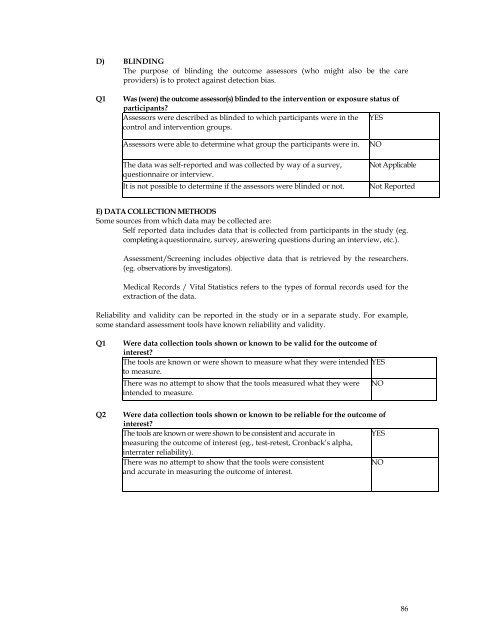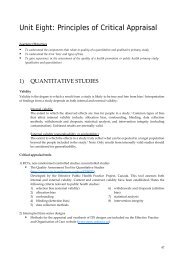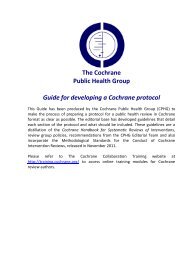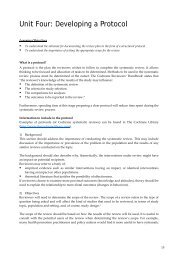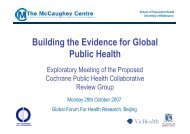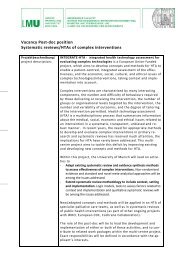Train the Trainer Course book - Cochrane Public Health Group
Train the Trainer Course book - Cochrane Public Health Group
Train the Trainer Course book - Cochrane Public Health Group
Create successful ePaper yourself
Turn your PDF publications into a flip-book with our unique Google optimized e-Paper software.
D) BLINDING<br />
The purpose of blinding <strong>the</strong> outcome assessors (who might also be <strong>the</strong> care<br />
providers) is to protect against detection bias.<br />
Q1<br />
Was (were) <strong>the</strong> outcome assessor(s) blinded to <strong>the</strong> intervention or exposure status of<br />
participants?<br />
Assessors were described as blinded to which participants were in <strong>the</strong> YES<br />
control and intervention groups.<br />
Assessors were able to determine what group <strong>the</strong> participants were in.<br />
The data was self-reported and was collected by way of a survey,<br />
questionnaire or interview.<br />
It is not possible to determine if <strong>the</strong> assessors were blinded or not.<br />
NO<br />
Not Applicable<br />
Not Reported<br />
E) DATA COLLECTION METHODS<br />
Some sources from which data may be collected are:<br />
Self reported data includes data that is collected from participants in <strong>the</strong> study (eg.<br />
completing a questionnaire, survey, answering questions during an interview, etc.).<br />
Assessment/Screening includes objective data that is retrieved by <strong>the</strong> researchers.<br />
(eg. observations by investigators).<br />
Medical Records / Vital Statistics refers to <strong>the</strong> types of formal records used for <strong>the</strong><br />
extraction of <strong>the</strong> data.<br />
Reliability and validity can be reported in <strong>the</strong> study or in a separate study. For example,<br />
some standard assessment tools have known reliability and validity.<br />
Q1<br />
Q2<br />
Were data collection tools shown or known to be valid for <strong>the</strong> outcome of<br />
interest?<br />
The tools are known or were shown to measure what <strong>the</strong>y were intended YES<br />
to measure.<br />
There was no attempt to show that <strong>the</strong> tools measured what <strong>the</strong>y were<br />
intended to measure.<br />
Were data collection tools shown or known to be reliable for <strong>the</strong> outcome of<br />
interest?<br />
The tools are known or were shown to be consistent and accurate in YES<br />
measuring <strong>the</strong> outcome of interest (eg., test-retest, Cronback’s alpha,<br />
interrater reliability).<br />
There was no attempt to show that <strong>the</strong> tools were consistent<br />
NO<br />
and accurate in measuring <strong>the</strong> outcome of interest.<br />
NO<br />
86


